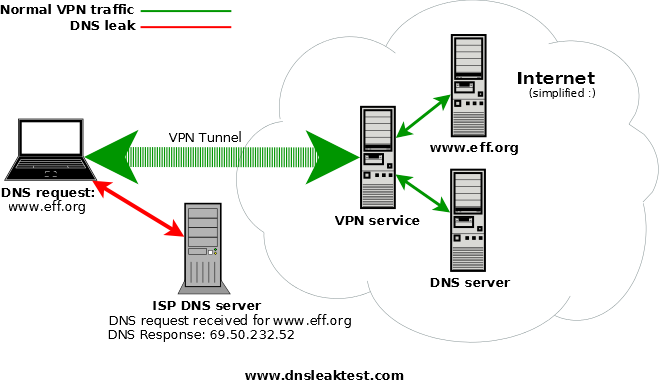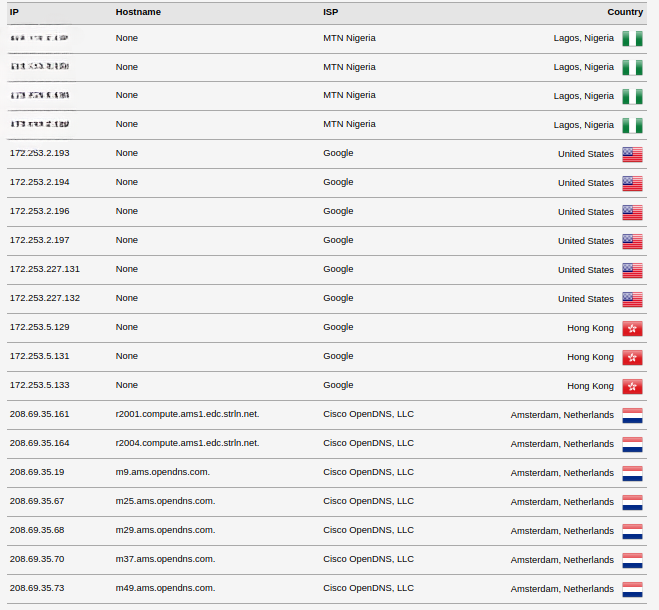It is of utmost importance to ensure that all internet traffic from your computer is routed through the anonymity network when utilizing an anonymity or privacy service. If any data leaks outside the secure connection to the network, any individual monitoring your traffic will be able to document your activities.
The domain name system (DNS) is responsible for translating domain names like www.privacyinternational.org into numerical IP addresses (e.g., 123.123.123.123) necessary for routing data packets over the Internet. Whenever your computer needs to communicate with an Internet server, such as when you enter a URL in your browser, it contacts a DNS server and requests the corresponding IP address. Most Internet service providers allocate their customers a DNS server that they control and employ to log and record their customers' online activities.
Under certain circumstances, even when connected to the anonymity network, the operating system may persist in using its default DNS servers instead of the anonymous DNS servers assigned by the anonymity network to your computer. DNS leaks pose a significant threat to privacy since the anonymity network might give a false sense of security while private data is unintentionally disclosed.
If you harbour concerns about DNS leaks, it is also essential to familiarize yourself with transparent DNS proxy technology to ensure that the solution you select effectively prevents such leaks.

Understanding DNS Leaks and Safeguarding Your Privacy Online
In today's digital age, privacy concerns are paramount, especially when it comes to our online activities. One particular area of vulnerability is the Domain Name System (DNS), which plays a crucial role in translating domain names into IP addresses. DNS leaks can pose a significant threat to our privacy, compromising the effectiveness of anonymity networks and potentially exposing our data. In this article, we will explore the implications of DNS leaks and discuss measures to mitigate these risks.

The DNS Leak Test:
Conducting a DNS leak test is an important step in assessing the effectiveness of privacy measures while using an anonymity or VPN service. Such a test involves examining whether DNS requests originating from your computer are being routed through the designated anonymity network. It is crucial to safeguard your IP address during these tests to maintain your privacy.
Understanding the Test Results:
The results of a DNS leak test provide valuable insights into the security of your online activities. The identified servers in the test are the ones responsible for resolving domain names to IP addresses each time you enter a website address in your browser. These servers, usually controlled by Internet service providers (ISPs) or other entities, have the potential to associate your IP address with the names of all the websites you visit and retain this information indefinitely.
Implications of DNS Leaks:
While it is not guaranteed that the identified servers log or store this data indefinitely, the possibility exists, and we must trust their stated policies. If you are connected to a VPN service and any of the servers listed in the test results are not provided by your VPN service, it indicates a DNS leak. In such cases, you are inadvertently placing your trust in the owners of those servers to handle your private data securely.
Mitigating DNS Leaks:
To safeguard your privacy and mitigate the risks associated with DNS leaks, it is crucial to take proactive measures. Here are some recommendations:
1. Utilize a reputable VPN service: When connected to a VPN, ensure that all DNS requests are routed through the VPN's designated servers. This prevents your ISP or other potential adversaries from accessing your DNS data.
2. Configure DNS settings: Verify that your operating system is configured to use the DNS servers provided by your VPN service. This step ensures that DNS requests are routed through a secure VPN connection, minimizing the chances of leaks.
3. Employ DNS leak protection: Some VPN services offer built-in DNS leak protection features. Enable this option to automatically prevent any potential leaks and enhance your overall privacy.
4. Perform regular DNS leak tests: Conduct periodic DNS leak tests to ensure the effectiveness of your privacy measures. By staying vigilant, you can promptly identify and rectify any leaks that may compromise your privacy.
Conclusion:
Maintaining privacy and security while browsing the internet is crucial in today's interconnected world. Understanding the implications of DNS leaks and taking appropriate steps to mitigate them is vital for protecting your personal information. By employing reputable VPN services, configuring DNS settings correctly, and conducting regular DNS leak tests, you can bolster your online privacy and enjoy a safer browsing experience.
















0 Comments